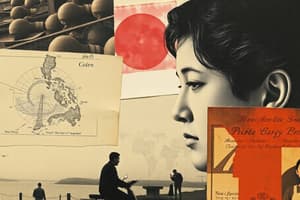Podcast
Questions and Answers
What is the primary objective of Araling Panlipunan in the Philippine education system?
What is the primary objective of Araling Panlipunan in the Philippine education system?
- To develop awareness of global economic systems (correct)
- To specialize in mathematical reasoning and analysis
- To foster appreciation of Filipino culture and history
- To focus solely on historical events of the world
Which component of Araling Panlipunan examines the physical features and resources of the Philippines?
Which component of Araling Panlipunan examines the physical features and resources of the Philippines?
- Culture and Society
- Geography (correct)
- History
- Government and Citizenship
What teaching strategy is emphasized in Araling Panlipunan to enhance student engagement?
What teaching strategy is emphasized in Araling Panlipunan to enhance student engagement?
- Interactive activities like debates (correct)
- Use of lecture-based presentations
- Standardized testing
- Independent study with textbooks
Which of the following is NOT a key component of Araling Panlipunan?
Which of the following is NOT a key component of Araling Panlipunan?
What method is commonly used for assessment in Araling Panlipunan?
What method is commonly used for assessment in Araling Panlipunan?
Flashcards are hidden until you start studying
Study Notes
Araling Panlipunan
-
Definition:
- A subject in the Philippine education system focusing on social studies, history, geography, economics, and government.
-
Objectives:
- Develop critical thinking and awareness of societal issues.
- Foster appreciation of Filipino culture and history.
- Encourage civic responsibility and active participation in community affairs.
-
Key Components:
-
History:
- Study of significant events, figures, and movements in Philippine history.
- Understanding colonial impact and independence.
-
Geography:
- Examination of the Philippines' physical features and resources.
- Impact of geography on culture and economy.
-
Economics:
- Basics of economic systems, resources, and trade.
- Understanding local and global economic interactions.
-
Government and Citizenship:
- Structure of the Philippine government and its functions.
- Rights and responsibilities of citizens.
-
Culture and Society:
- Exploration of Filipino customs, traditions, and values.
- Influence of religion, language, and arts on society.
-
-
Teaching Strategies:
- Use of interactive activities like debates, role-playing, and simulations.
- Incorporation of multimedia such as documentaries and online resources.
- Encouragement of field trips to historical sites and museums.
-
Assessment Methods:
- Quizzes and exams to evaluate knowledge retention.
- Project-based assessments to encourage research and creativity.
- Group discussions to assess understanding and critical thinking skills.
-
Current Issues:
- Analysis of contemporary societal challenges (e.g., poverty, environmental concerns).
- Discussions on national identity and global citizenship.
-
Integration with Other Subjects:
- Collaborates with languages, arts, and science to provide a holistic educational approach.
- Encourages interdisciplinary projects that connect concepts.
Definition
- A subject within the Philippine education system covering social studies, history, geography, economics, and government.
Objectives
- Enhance critical thinking and raise awareness of social issues.
- Promote appreciation for Filipino culture and its historical significance.
- Encourage civic responsibility and active community engagement.
Key Components
-
History:
- Focus on significant events, influential figures, and movements in the Philippines.
- Study the effects of colonial rule and the journey towards independence.
-
Geography:
- Explore the country's physical landscape and its natural resources.
- Understand how geographical features shape cultural identities and economic activities.
-
Economics:
- Introduction to different economic systems, resources, and trade dynamics.
- Analyze local and global economic relationships and their implications.
-
Government and Citizenship:
- Overview of the Philippine government's structure and its operational functions.
- Discuss the rights and responsibilities associated with being a citizen.
-
Culture and Society:
- Investigation of Filipino customs, traditions, and inherent values.
- Examine the role of religion, language, and the arts in shaping societal norms.
Teaching Strategies
- Engaging students through interactive activities like debates, role-playing, and simulations.
- Utilizing multimedia resources such as documentaries and online materials for enriched learning.
- Organizing field trips to historical landmarks and museums to offer experiential learning.
Assessment Methods
- Implementation of quizzes and exams to gauge knowledge retention effectively.
- Employing project-based assessments to foster research skills and creativity.
- Facilitating group discussions to evaluate comprehension and critical thinking abilities.
Current Issues
- Examination of pressing societal challenges, including poverty and environmental issues.
- Encouragement of discussions pertaining to national identity and the concept of global citizenship.
Integration with Other Subjects
- Subjects collaborate with languages, arts, and sciences to foster a comprehensive educational experience.
- Promotion of interdisciplinary projects that align various concepts and enhance understanding.
Studying That Suits You
Use AI to generate personalized quizzes and flashcards to suit your learning preferences.




